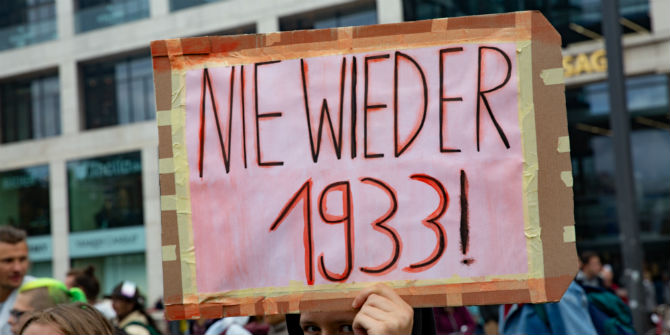 Settling our financial obligations to the EU could cost up to €6obn. Iain Begg explains why the figure is so high, looks at whether there is much scope for negotiation and asks what would happen if Britain simply refused to pay.
Settling our financial obligations to the EU could cost up to €6obn. Iain Begg explains why the figure is so high, looks at whether there is much scope for negotiation and asks what would happen if Britain simply refused to pay.
As many a preacher has declaimed, citing Timothy 6:10 from the Bible, ‘the love of money is the root of all kinds of evil’; it could also be what scuppers an amicable Brexit deal. According to Ivan Rogers, in his testimony to the House of Commons European Scrutiny Committee, commenting on figures emanating from the European Commission team led by Michel Barnier, the UK could be facing a bill of some €40-60 billion to escape from its financial obligations to the EU.
Even the lower figure is double what the UK ‘sent to Brussels’ in 2015, after deducting the rebate to which the UK has been entitled since 1984 (in other words, the direct burden on British tax-payers), and nearly three times what was ‘sent’ in 2014. This prompts three questions:
- Why is it so much?
- Can the bill be negotiated downwards and, if so, by how much?
- More provocatively, could the UK refuse to pay and, if it does, what might then happen?
The bulk of the €60 billion comes from commitments to the multi-annual financial framework (MFF) of the EU budget for the period 2014-20, which sets amounts for annual EU spending. The MFF is embodied in a legally binding 2013 regulation agreed, as is customary, by both the member states (acting through the Council) and the European Parliament.

The regulation has a clause explaining what is supposed to happen if the EU enlarges while the MFF is in progress and another about what should happen if Cyprus is reunified, but makes no provision for a member state leaving. As explained in more detail in a paper by Alex Barker, the UK could be liable for its full share of the MFF up to the end of 2020, even if it manages to exit in April 2019 – a gross cost to UK taxpayers of at least €30 billion. That this might be considered unfair or unreasonable is, in a strict legal reading, beside the point, although British negotiators are bound to take this line.
The second main component is for budgetary commitments already made by the EU up to the date of Brexit, but for which the payments will only be due later (known in Brussels-speak as RAL, the French acronym for reste à liquider – still to be settled). These arise for multi-annual economic development projects, predominantly in the less prosperous parts of the EU.
According to EU rules, programmes can give rise to payments for up to three years after the notional end of the accounting period (N+3). By 2019, RAL could be over €200 billion and the UK share, based on its current share of 12-15% of EU revenue, of the order of €25 billion.
The UK could also be liable for the pensions of EU employees who retired while the UK was a member of the Union. There is a figure in the EU accounts (€64 billion) for the capitalised value of those pensions and negotiations would then focus on what was a reasonable share to ascribe to the UK if it wanted to buy itself out its share of future commitments. The likely starting-point is again the UK’s current share of EU revenue, implying a cost of €7-9 billion
The potential gross cost can be partly offset by subtracting flows of money the UK can expect to receive. Thus, if the UK is asked to pay into the EU budget for the remainder of the 2014-2020 MFF, it should continue to participate in a number of EU spending programmes. Money would therefore still accrue to British farmers, further economic development projects and researchers winning new EU projects, returning some €9 billion per year to the UK.
Moreover, some of the RAL will flow to the UK, as will some of the pensions, although there is no easy way to quantify either flow. However, because the UK is a substantial net contributor to the EU budget, these return flows will only mitigate the gross cost, leaving a bill still of the order of €40 billion.
The UK could also claim a share of the EU’s physical assets (notably, buildings and equipment) and any net financial assets, in effect asking to be bought out of its share of the EU’s equity capital. As a new analysis from Bruegel shows, EU assets are as high as €154 billion, suggesting a UK share could be some €20 billion, although the authors express doubts about some of the components of their figures. Clearly, the UK paid towards any such assets over the period since 1973, but it may be trickier to secure agreement that the ‘divorcing partner’ is entitled to a share of them.
New members joining the EU do not have to put in money to buy a share of the EU’s assets, which could justify not paying out to a departing member. New member states are, however, expected to subscribe capital to the European Investment Bank (EIB), implying one area where there may be a case.
However, the amount of EIB capital actually paid up is only a small proportion of the notional figure in the EIB accounts and there would be uncertainty about how much would have to be retained by the EIB to guarantee its loans (a proportion of which are to the UK).
Negotiations are invariably difficult when money is at stake: witness successive bust-ups around the EU budget. Nevertheless, there should be some scope for cutting the bill, although it would be prudent to acknowledge that the €60 billion gross figure is far from fanciful. What then happens if the gap between what the EU seeks and the UK offers cannot be bridged?
The nuclear option is to refuse to pay and just leave the EU, a stance likely to poison the atmosphere around other dimensions of the negotiations, leading to a ‘hostile’ (as opposed to ‘hard’) Brexit. The EU could take legal action against the UK, but it is far from obvious which court would hear the case, bearing in mind that in those circumstances the writ of the European Court of Justice would no longer apply to the UK.
A less inflammatory option would be some form of transition allowing the UK to sever its budgetary links with the EU over a three to five year period. A transitional period would also have domestic advantages in easing the shift away from EU funding for those supported by EU programmes for farm support, research and economic development. The government appears to be willing to maintain such support up to 2020 anyway, so that it would be straightforward to leave EU mechanisms to deal with it rather than reinventing the wheel in domestic public administration.
The sting in the tail is that the infamous £350 million a week windfall for the NHS will not be deliverable soon, and certainly not in advance of the next planned British general election in 2020, even if none of the (highly likely) indirect effects on the UK public finances materialise. Possible indirect effects would arise from any fall-off in tax revenue consequent on either a slowdown in the economy or a loss of corporate tax receipts from profitable companies which opt to relocate so as to remain part of the single market, as well as from probable administrative costs of Brexit, such as the need to restore customs posts.
As the Japanese educationalist, Shinichi Suzuki, put it, ‘love is grand, divorce is a hundred grand.’
This post represents the views of the author and not those of the Brexit blog, nor the LSE. It first appeared at The UK in a Changing Europe.
Iain Begg is a senior fellow of The UK in a Changing Europe and a Professorial Research Fellow at the European Institute, London School of Economics and Political Science.







Let the EU calculate how much the assets owing are and net this off any figure they reckon we will owe and we can discuss.
If not, no discussion and we just walk.
yes – just walk away from our major trading partner and closest allies and see what happens. This isn’t a £5 bet in dispute with a mate from down the pub – we are talking international relations and reputation of the country for reliability. UK credibility for other trade deals will be so much stronger when we are seen as an international joke.
So we should just cough up whatever amount someone from the EU plucks from the air, without ensuring that we are refunded appropriately for any assets?
Then I read your second comment and saw where you were coming from, sigh!
“So we should just cough up whatever amount someone from the EU plucks from the air?”
What do you mean by that? The amount, as the article clearly outlines, is based on budgetary commitments the UK has signed up and agreed to.
You are proposing that Brexit Britain, desperate for new trade deals, promotes itself by renegating on agreements with past trade partners? Not to mention the cost for the UK in alienating its biggest trading partner. Your national pride seems to blind your judgement.
Sound article. But I think the pensions debt could be more. If employers leave a pension fund with liabilities in it, they need to pay more – a premium – in case those liabilities change in future (upwards, say if pensioners live longer). Its called cessation value – I would charge extra to the UK for it if I were tasked with forging a deal from the EU’s viewpoint
The UK has been paying in more than it has been getting back.As to pensions and other liabilities, there can be no less accruing to the UK than overall liabilities if the UK is leaving the EU.If the money is not there, was the EU Commission running a ponzi scheme?
There is another consideration if the EU Commission and the remnant EU members are less than accommodating in Brexit matters financial.The history of EU accountability is fairly shocking, especially in financial terms.Chutzpah is what comes to mind the financial claims now being bandied about by pro-EU elements.The EU has its own court, judges, rules for themselves and different rules for others, its own auditors, its own organisation to follow up on fraud and its own tortuous, oily and frankly quite unbelievably slippery way to justify its ways and means.Really, it is quite a story, researched and written about by more than a few insiders.Every positive contributor to EU financial affairs would be fully justified taking the EU to court to recover what they paid in net since the EC turned into EU.Since 1999, EU financial fraud investigated has been one thousandth of the EU fraud discovered.The claim that the UK should continue to give moneys to the EU remnant after Brexit is truly laughable.
Dear Jacob,
What fraud are you talking about? Can you name examples?
If you refer to the 0.5% or so of annual spend whose documentation is deficient, well that is no different from the UK, and you certainly can’t conclude it is a fraud. All governments struggle to keep books exact to the penny. These are not material amounts, and it does not mean they have been incorrectly spent.
I read you and can’t help but conclude you have no idea what the EU is.
@GregPJ.To help you on your way, try richardmilton.net for starters.
@GregPJ .My perspective is informed by the mainstream media, the internet and physical books.Since I am a private person without the authorisation from the EU Commission to investigate its financial affairs, I give you and everyone who reads my opinion my personal opinion, no more, no less.As to scholarship, I leave that to the scholars.As to sources, in this regard, a few minutes on the net divulges a host of information from which to choose.Obviously, since each person is different and in a different situation,etc.,etc., each person searching the net for information will come to a somewhat different conclusion.
We could be exchanging and rubbishing each other’s sources on the net ad infinitum, considering the binary positions dominating the pros and cons of the EU.It is not as though the issue has had little exposure in recent years.So, please, except my opinion as such, this time, and disagree by all means, this time.
As to your comparison between the EU’s accounts and the national accounts, I categorically reject any relevance whatever.The nation’s finances are subject to oversight by elected representatives and the various checks and balances in place or able to be put in place.Whatever the faults of democracy and its parliamentary system in place in the UK or any other sovereign nation-state, it is amenable to correction within the system, without a bloody revolution.If there is fraud within the nation’s finances, and inevitably there is some, it is part of a system of government answerable to the electorate.The EU is a different kettle of fish altogether.It has shown convincingly to be dictatorial, imperious and utterly arrogant in its dealings with dissent within the member nations’ electorates.Again, if you have followed the EU Commissions’ meanderings and self-justifications over the years and do not agree with my opinion, so be it.I find it utterly strange that people within the EU would still defend that institution unless they know or expect its demise to be to their financial/economic detriment.I leave it to insiders, whistleblowers, scholars and other experts’ opinions to round off my total information package when forming my opinion, and, with due respect, reserve the right as a non-expert to add comment on LSE blogs.
The expectation of some share of the EU’s assets being credited to U.K. is tendentious and unlikely to produce anything. The EU is not being wound up so expect no distribution. As the article points out, there was no payment for a share of the existing assets at the time of accession.
By way of some historical analogy – the Irish republic (or whatever it called itself in 1922) was never going to get a share of the imperial assets when it left the U.K. London should not expect anything from Brussels.
A good divorce lawyer will tell you to just settle whatever is reasonably asked for and then move on – it’s not much different here.
Doesn’t add up UK financially propping up EU27 countries that are not net contributors but receive big funding. EU business model is broken
House of Lords European Union Committee, March 2017:
‘However, the strictly legal position of the UK on this issue appears to be strong.
Article 50 provides for a ‘guillotine’ after two years if a withdrawal agreement
is not reached unless all Member States, including the UK, agree to extend
negotiations. Although there are competing interpretations, we conclude that
if agreement is not reached, all EU law—including provisions concerning
ongoing financial contributions and machinery for adjudication—will cease
to apply, and the UK would be subject to no enforceable obligation to make
any financial contribution at all.’
https://www.publications.parliament.uk/pa/ld201617/ldselect/ldeucom/125/125.pdf
Their Audits are not clean so how can they say what we owe?